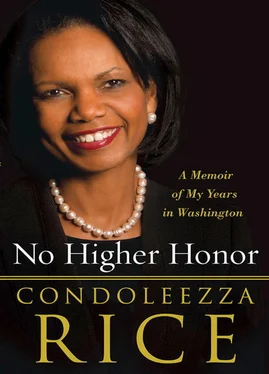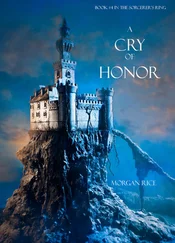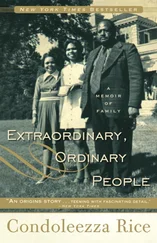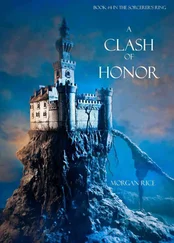I jumped into a minivan with other Bush supporters for the trip to the capitol for the victory speech. It was freezing cold in Austin, and we stood on the square, rocking to “Y’all Ready for This” from the Jock Jams album and hugging each other. But something was wrong. Al Gore hadn’t conceded. I could also see the big screen displaying CNN’s election coverage. The margin of victory in Florida was shrinking very fast.
Then Karen Hughes called her husband, Jerry, and reported that although Gore had called the governor to concede, he had subsequently withdrawn his concession. After another hour or so, we all shuffled back to the minivan and went back to the hotel. There was confusion but not really despair. I went to bed and awoke to the news that Florida would be contested.
When I spotted Fox News reporter Carl Cameron in the lobby, I asked him, “What’s going on?”
“I thought you might know,” he said and then went on to tell me that there would likely be a recount.
I also ran into Bob Blackwill. “You know what this is like?” he asked. “It’s like eating a really spicy meal before bed and having a really bad dream. You think to yourself, ‘Must have been what I ate last night. Boy, I’m glad to wake up from that one!’”
But of course it wasn’t a dream. I stayed in Austin a few days. I hung out near Karl Rove, trying to understand what was really happening via his sophisticated county-by-county analysis of our chances in Florida.
Governor Bush called the morning after the election to say that he wanted me to be national security advisor but we’d obviously have to wait a bit on any announcement. It was surreal, but we went through the motions of planning a foreign policy transition that might never happen. One particularly bad idea was to have a photo op of the governor and me sitting in front of the fireplace discussing foreign policy. It looked like a faux Oval Office shot and was properly ridiculed. I decided to go home to California.
The return to California gave me a chance to spend quality time with my father. Meanwhile, I watched the ups and downs in Florida, my mood swinging with every court decision. I asked Steve Hadley to be the deputy national security advisor if I needed one. The two of us met with the Vulcans in Washington and talked about how to organize Bush’s foreign policy, if we were given the opportunity. After the session, Steve and I were sitting in the conference room of his law office when we got word that the Florida Supreme Court had ordered a manual recount. The Bush lawyers had fought to prevent that, and though no one could know the outcome it seemed to portend a probable defeat.
We walked outside toward the restaurant for dinner. “Steve,” I said, “I would have loved to serve with you. You would have been a great deputy national security advisor.” I flew home to California the next day, believing that it was over. When I got off the plane and into the car, my driver, Mary Reynolds, gave me an update. The Supreme Court had, by a 5–4 decision, issued a stay, halting the manual recounts and setting a hearing for the matter on Monday, December 11. That meant that the judges in the majority were likely to rule in favor of Bush, certifying him as the winner of Florida’s electoral votes. George W. Bush would indeed become the forty-third President of the United States.
That night I went to a birthday party for George Shultz at the Bohemian Club in San Francisco. The mood was very festive, and everyone congratulated me on my appointment. It hadn’t been announced, but it had been assumed for a long time that I would accompany the governor to Washington as national security advisor. I accepted the thanks, but the next morning I called the governor and told him that I didn’t think I could go to Washington. I explained that I could not leave my father in his current state. In fact, I’d already told a couple of close friends. I remember a conversation with Janne Nolan, with whom I’d been a research fellow at Stanford in 1981. “People would understand if I said I can’t do it because of the children,” I said. “They won’t understand my obligations to my father.”
“Rent a baby,” Janne advised. We laughed, but she was one of the few who seemed to understand.
The governor called back and said that he understood but it was important I go. “I’m not asking you to leave your dad alone. He’s always been there for you, and you want to be there for him. We’ll make it work.” We agreed that I would go to Washington but travel back to California every two weeks. In my heart I knew that it wasn’t a practical solution, but I wasn’t prepared to leave my father alone.
Three days before Christmas I went to have dinner at the home of my good friend and sports buddy Lori White. I stopped by to see Daddy on the way, and he seemed in pretty good spirits. I called a few hours later as I was leaving Lori’s house, and Daddy got on the phone.
“I’m going home,” he said.
“Daddy, you are at home,” I answered.
“No, it’s time for me to go home.”
I knew in my heart what he meant, and it terrified me. My father, a Presbyterian minister and a man of great faith, believed that at the end of our earthly existence God calls us home to eternal life.
I rushed to his house. He seemed fine, and I left. I drove the ten minutes to my house. As I walked in the door, my stepmother, Clara, was calling. Daddy had stopped breathing. We rushed to the hospital. This time the physical and mental damage was irreparable. On Christmas Eve, after slipping into a coma, my father died.
I’d told Daddy just after the election that George W. Bush wanted me to go to Washington and become national security advisor. Daddy was able to communicate his understanding, but he also cried, and I couldn’t tell whether they were tears of joy for my achievement or tears of despair because he knew that we would be separated. With his death he resolved my dilemma. Was it coincidence? I’ve always prayed that it was because I can’t bear to think that John Wesley Rice, Jr., deliberately did that one last thing to make sure I fulfilled my dreams. Honestly, it would have been just like him.
Inauguration Day
I SAT ON the dais a few rows back of the President-elect, my feet freezing and covered in a plastic poncho to protect me from the sleet of that January day. I reflected on my journey to that point and ached to have my parents sitting on the Mall to see George W. Bush take the oath of office, ushering me into the White House with him. Still, it was a joyous day as I took in the sights and sounds of this most remarkable demonstration of the United States’ democratic stability, despite the controversy surrounding the election. At the lunch in the National Statuary Hall, the new President entered for the first time to the strains of “Hail to the Chief.” I felt chills of pride and excitement. And then the celebration was over. We returned directly to the White House and got down to work.
From that day on, my “routine” reminded me that nothing would, in fact, be routine. Entering through the guarded gate each morning, passing stiffly standing marine guards, walking through the corridors that Lincoln and Roosevelt, Truman and Kennedy and Reagan had frequented, gave me an extraordinary sense of a place—a small place—in history. But those who became too focused on the atmosphere didn’t last very long. There was work to do, under enormous pressure, and missteps could have dire consequences. The White House was a hothouse, and everyone who worked in those highly coveted jobs knew the stakes.

2
HONEST BROKER
I’D GIVEN A LOT of thought to the type of organization that I wanted to form. The National Security Council was established by the National Security Act of 1947 when, after World War II, it became clear that the United States would be permanently and dominantly involved in world politics. There are four original statutory members of the National Security Council: the President, the Vice President, the secretary of state, and the secretary of defense. The only other statutory position created through the act is the executive secretary of the NSC, a largely administrative but very vital function. That person manages the paper flow, oversees the Situation Room, handles interagency communication, and often staffs the President during travel. The role requires a very good administrator who can “keep the trains running on time” internally and work seamlessly with the other agencies. But it also helps to have a seasoned foreign policy hand who can understand the context and meaning of the paper he’s seeing. Our executive secretaries, Bob Bradtke, Steve Biegun, and then Greg Schulte, possessed both sets of qualifications.
Читать дальше













